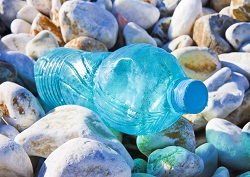Biotech solutions offer greener plastic waste recovery
The new biotech process, developed by the EU-funded BIOCLEAN project, will mitigate the effects of plastic pollution in sensitive environments, help the plastics sector achieve production efficiencies and provide recovery and recycling experts with guidance on the most effective options for breaking down different plastics. The project began by isolating and selecting microbes from plastic waste lifted from the sea, landfills, composting facilities, anaerobic waste treatment plants and contaminated industrial sites. Bacteria and fungi were then assessed and those shown to be effective in breaking down, detoxifying and valorising plastic waste isolated. Promising bacteria were combined with chemical pre-treatments and tested on a range of plastics. This process was then scaled up at the municipal composting facility of Chania on the Greek island of Crete, which demonstrated its ability to enhance the natural biodegradation of plastics in organic waste composting. Inserting plastics into the so-called circular economy – where materials are valorised and reused after the end life of a product – will therefore greatly benefit the environment and create business opportunities in the waste recovery sector. Scientists have known that synthetic plastics do biodegrade in certain marine environments as well as in landfills, compost and soil, but the processes and conditions required have to date not been well understood. BIOCLEAN has helped to deepen scientific understanding of this process, and shown that biotech solutions for effectively and sustainably disposing of plastic waste are feasible. In particular, the consortium focused on PVC, polystyrene, polypropylene and polyethylene, which are widely used in industry and responsible for a great deal of plastics waste. This processing breakthrough could bring benefits to the plastics industry, which is seeking to reduce its impact on the environment and achieve production efficiencies through higher recycling rates. Plastic products are extensively used in numerous industries ranging from automotive and electrical appliances to building materials and food packaging. The flexibility of plastic means that it is used extensively in high tech innovations applications, and this trend is predicted to grow. However, while plastic recycling has increased since the 2008 crisis brought home the need for greater economic efficiency, more could be done. Plastic, a non-biodegradable disposable material, has begun to seriously pollute oceans across the globe. Miniscule plastic pieces have a structure that due to their small size, concentrate contaminants like sponges along with other chemical pollutants. A lack of waste collection points at ports has severely hampered attempts at marine plastics recycling, and as a result, this noxious material is often not collected and simply thrown back into the sea. Even when this petroleum-based waste is removed from the ocean, it tends to end up in a dump or incinerated, which causes emissions that are harmful to the environment or result in contaminated land waste. The BIOCLEAN project was completed in August 2015. For further information please visit: BIOCLEAN project website
Countries
Italy



